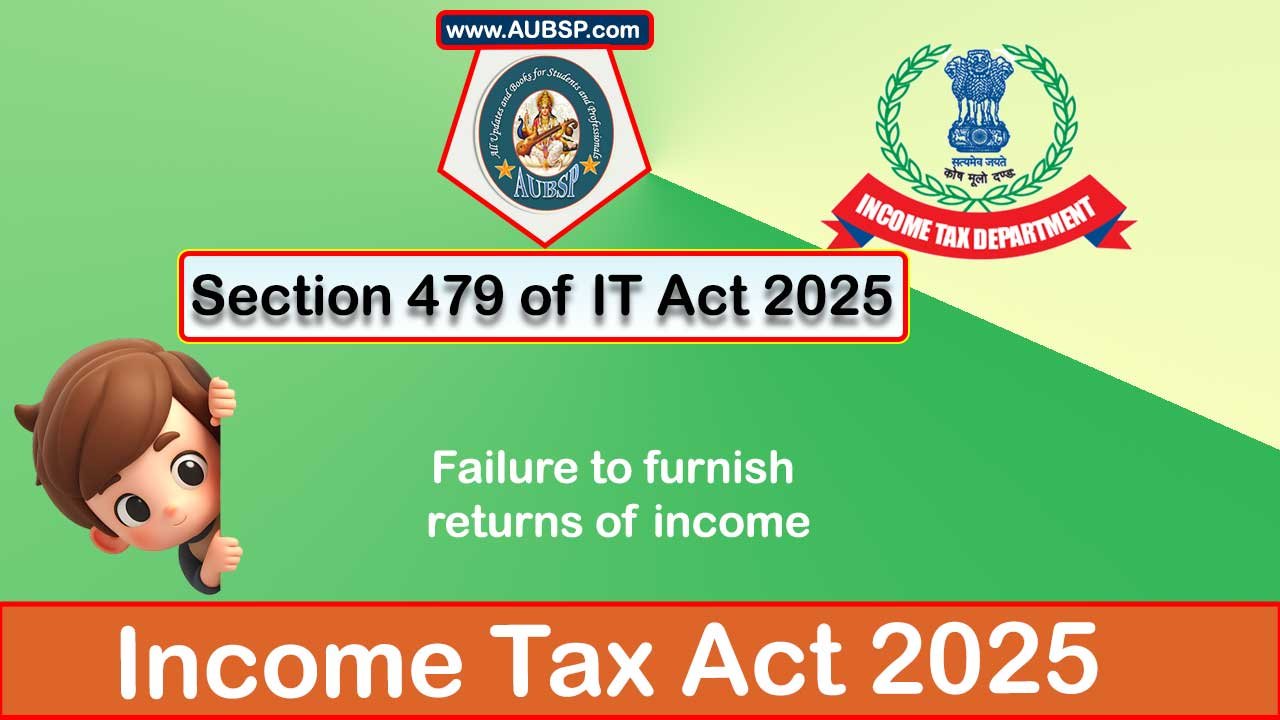Failure to furnish returns of income
[Section-479 as per the Income Tax Act, 2025 (this Act) w.e.f. 1st April, 2026.]
Section 479(1) of Income Tax Act 2025
479(1) If a person wilfully fails to furnish in due time the return of income, which is required to be furnished under section 263(1), or by notice given under sections 268(1) or 280, he shall be punishable,—
- 479(1)(a) in a case, where the amount of tax, which would have been evaded if the failure had not been discovered, exceeds twenty- five lakh rupees, with rigorous imprisonment for a term which shall not be less than six months but which may extend to seven years and shall also be liable to fine;
- 479(1)(b) in any other case, with imprisonment for a term which shall not be less than three months but which may extend to two years and shall also be liable to fine.
Section 479(2) of Income Tax Act 2025
479(2) A person shall not be proceeded against under sub-section (1) for failure to furnish in due time the return of income under section 263(1) for any tax year, if––
- 479(2)(a) the return is furnished by him before the expiry of one year from the end of the tax year or a return is furnished by him under section 263(6) within the time provided in that section; or
- 479(2)(b) the tax payable by such person, not being a company, on the total income determined on regular assessment, as reduced by the advance tax or self-assessment tax, if any, paid before the expiry of one year from the end of the tax year, and any tax deducted or collected at source, does not exceed ten thousand rupees.
FAQs on Section 479 of Income Tax Act 2025
Here are the max possible FAQs based on Section 479 of the Income Tax Act, 2025:
What does Section 479(1) of the Income Tax Act, 2025 deal with?
Section 479(1) deals with the punishment for willful failure to furnish a return of income in due time as required under section 263(1), or upon notice under sections 268(1) or 280.
What is the punishment if the tax sought to be evaded exceeds ₹25 lakhs?
If the tax evaded exceeds ₹25 lakhs, the offender shall face rigorous imprisonment of not less than six months, which may extend to seven years, and shall also be liable to a fine.
What is the punishment in other cases of willful failure to furnish returns?
In other cases, the offender shall face imprisonment of not less than three months, which may extend to two years, and shall also be liable to a fine.
Does the punishment under Section 479(1) apply to all cases of delay in filing returns?
No. The punishment applies only to cases of willful failure to furnish returns as required under the specified sections and where the exceptions under sub-section (2) do not apply.
Are there any exceptions where a person won’t be prosecuted under Section 479(1)?
Yes, Section 479(2) provides exceptions where prosecution is not initiated.
What is the first exception under Section 479(2)?
If the person furnishes the return before the expiry of one year from the end of the tax year or files a return under section 263(6) within the prescribed time, prosecution shall not be initiated.
What is the second exception under Section 479(2)?
If the person (not being a company) owes a tax amount not exceeding ₹10,000 after adjusting advance tax, self-assessment tax paid within the year, and TDS/TCS, then they will not be prosecuted.
Does Section 479(2) apply to companies as well?
The monetary threshold exemption under 479(2)(b) applies only to persons other than companies.
If a return is filed late but within one year of the end of the tax year, can prosecution still occur?
No, if the return is filed within one year from the end of the tax year, prosecution under Section 479(1) will not apply.
What if a return is filed under section 263(6) within the permitted time?
Filing a return under section 263(6) within the time provided is a valid exception from prosecution under Section 479(1).
Does the law differentiate between quantum of evasion for punishment?
Yes, the punishment is more severe (minimum six months to seven years) if the tax evaded exceeds ₹25 lakhs.
Is a fine mandatory in all cases under Section 479?
Yes, in both categories of offences under Section 479(1)(a) and 479(1)(b), a fine is mandatory in addition to imprisonment.
Is intent a necessary element for prosecution under Section 479(1)?
Yes, the failure must be willful to attract punishment under Section 479(1).


